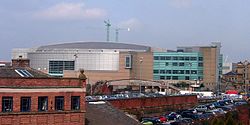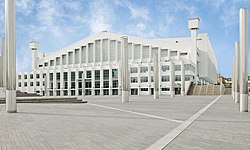Top Qs
Timeline
Chat
Perspective
2009 Premier League Darts
Darts competition From Wikipedia, the free encyclopedia
Remove ads
The 2009 Whyte & Mackay Premier League was a darts tournament organised by the Professional Darts Corporation.
The tournament kicked off at the Echo Arena Liverpool, which hosted the biggest ever crowd for a PDC event of almost 8,000 in 2008.
New venues in Edinburgh and Exeter joined some of the UK's biggest arenas, including Belfast's Odyssey Arena, Manchester's MEN Arena, Birmingham's National Indoor Arena, the Sheffield Arena and Newcastle's Metro Radio Arena.
The tournament came to a conclusion with the play-offs on Monday 25 May at the Wembley Arena – coinciding with the Football League play-offs at the neighbouring Wembley Stadium over the same weekend. Phil Taylor was defending his Whyte & Mackay Premier League title once again, however he failed to retain it after losing to Mervyn King 10–6 in the semi-finals. James Wade beat King 13–8 in the final, to claim the £125,000 first prize and the first Premier League not to be claimed by Taylor.
Remove ads
Qualification
The top six players from the PDC Order of Merit following the 2009 PDC World Darts Championship were confirmed on 5 January. Jelle Klaasen and Wayne Mardle were named as the two Sky Sports wild card selections on 9 January.[1]
Qualifiers are as follows:
Venues
Fifteen venues were used in the 2009 Premier League, with the only changes from 2008 being Edinburgh and Exeter replacing Plymouth and Bournemouth.
Remove ads
Prize money
The prize fund increased again with the top prize now reaching £125,000, and the total prize fund rising to £400,000.
Results
Summarize
Perspective
- Players in italics are challengers, and games involving them are best of 12 legs, not best of 14 as the regular matches, and they also don't count towards the standings.
League stage
Notes
† – Wayne Mardle didn't play in week ten because of a virus. John Part played two matches in week ten, with Mardle due to play two matches in week eleven, giving Part the night off that week.[16] However, Mardle was rushed into hospital with mumps on 15 April, which ruled him out of week eleven.[17] This meant that Mervyn King and James Wade each played twice during week eleven, with Mardle now due to play five matches in the last three weeks. Mardle had been due to play two matches in both weeks thirteen and fourteen, which would give King the night off in Sheffield, and Wade the night off in Cardiff.[18] However, Mardle was re-admitted to hospital, ruling him out of week twelve, and in accordance with tournament regulations after missing three consecutive Premier League match nights, was removed from the tournament. Mardle's match results from the tournament were also annulled, hurting some of the remaining players more than others. Following Mardle's removal from the tournament, in order for each remaining night to have four matches, there was a series of challenge matches featuring Robert Thornton, Adrian Lewis, Dennis Priestley, Mark Webster and Gary Anderson.[19]
* – Phil Taylor's average of 116.01 was, at the time, the highest recorded three-dart average in televised darts history. He broke his own record of 114.53, set against Wes Newton during the 2008 UK Open.
Play-offs – 25 May
Remove ads
Table and Streaks
Table
Top four qualify for Play-offs after Week 14.
NB: LWAT = Legs Won Against Throw. Players separated by +/- leg difference if tied.
Streaks
NB: W = Won; D = Drawn; L = Lost; N/A = Did Not Play; – indicates match did not count towards final standings
Remove ads
Player statistics
Summarize
Perspective
The following statistics are only for league stage games that contributed to the final standings. Annulled fixtures, challenge matches and play-offs are not included.
Phil Taylor
- Longest unbeaten run: 6
- Most consecutive wins: 3
- Most consecutive draws: 2
- Most consecutive losses: 1
- Longest without a win: 3
- Biggest victory: 8–2 (v. Jelle Klaasen, v. Raymond van Barneveld and v. Mervyn King)
- Biggest defeat: 4–8 (v. James Wade)
James Wade
- Longest unbeaten run: 5
- Most consecutive wins: 4
- Most consecutive draws: 1
- Most consecutive losses: 1
- Longest without a win: 2
- Biggest victory: 8–1 (v. Terry Jenkins)
- Biggest defeat: 1–8 (v. Mervyn King)
Raymond van Barneveld
- Longest unbeaten run: 3
- Most consecutive wins: 3
- Most consecutive draws: 1
- Most consecutive losses: 1
- Longest without a win: 3
- Biggest victory: 8–1 (v. John Part)
- Biggest defeat: 2–8 (v. Phil Taylor)
Mervyn King
- Longest unbeaten run: 4
- Most consecutive wins: 3
- Most consecutive draws: 3
- Most consecutive losses: 2
- Longest without a win: 5
- Biggest victory: 8–1 (v. James Wade)
- Biggest defeat: 2–8 (v. Phil Taylor)
Terry Jenkins
- Longest unbeaten run: 3
- Most consecutive wins: 1
- Most consecutive draws: 2
- Most consecutive losses: 3
- Longest without a win: 5
- Biggest victory: 8–3 (v. John Part)
- Biggest defeat: 1–8 (v. James Wade)
John Part
- Longest unbeaten run: 2
- Most consecutive wins: 1
- Most consecutive draws: 2
- Most consecutive losses: 2
- Longest without a win: 4
- Biggest victory: 8–5 (v. Terry Jenkins)
- Biggest defeat: 1–8 (v. Raymond van Barneveld)
Jelle Klaasen
- Longest unbeaten run: 2
- Most consecutive wins: 1
- Most consecutive draws: 2
- Most consecutive losses: 3
- Longest without a win: 6
- Biggest victory: 8–6 (v. Terry Jenkins)
- Biggest defeat: 2–8 (v. Phil Taylor)
Remove ads
References
External links
Wikiwand - on
Seamless Wikipedia browsing. On steroids.
Remove ads














